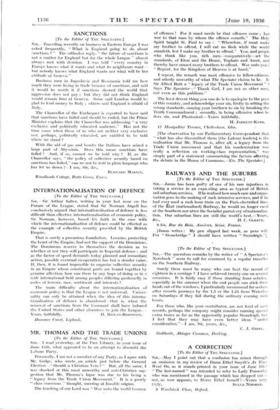MR. THOMAS AND THE TRADE UNIONS [To the Editor of
THE SPECTATOR.] S111,-- I read yesterday, at the Free Library, in your issue of June 12th, what appeared to be an attempt to discredit the Labour Party.
Personally, I am not a member of any Party, as I agree with Mr. Ledge, who wrotean article just before the General Election--" Should a Ch.ristian Vote ? " But, all the same, I was shocked at this most unworthy and anti-Christian sug- gestion that Mr. Thomas's lapse was due to his being a " legacy from the Trade Union Movement." It is a purely
" class conscious " thought, sneering at humble origins, _ The teaching of our Lord was " Woe unto the world because
of offences ! For it must needs be that offences come ; but woe to that man by whom the offence cometh." The Holy Spirit taught St. Paul to say : " Wherefore, if meat make my brother to offend, I will eat no flesh while the world standeth, lest I make my brother to offend." You, and people who think like you, rich men—comparatively—set the standards, of Eton and the House, Tophats and Ascot, and thereby have caused many brothers to offend. Woe unto you ! " Repent, for the Kingdom of Heaven is at hand."
I repeat, the remark was most offensive to fellow-citizens. and utterly unworthy of what The Spectator claims to be. Is Sir Alfred Butt a legacy of the Trade Union Movement ? Says The Spectator—" Thank God, I am not as other men, nor even as this publican."
The least decent thing you can do is to apologise to the poor of this country, and acknowledge your sin, firstly in setting the wrong standards, causing your brethren to sin by breaking the Tenth Commandment ; secondly, in being, offensive when he does sin, and Pharisaical.—Yours faithfully, H. JARRETT-KERR.
17 Montpellier Terrace, Cheltenham, Glos.
[The observation by our Parliamentary Correspondent that " what has also discomfited them [the Labour leaders], is the realisation that Mr. Thomas is, after all, a legacy from the Trade Union movement and that his condemnation was really a reflection on working-class representation," was simply part of a statement summarising the factors affecting the debate in the House of Commons.—En. The Spectator.]










































 Previous page
Previous page